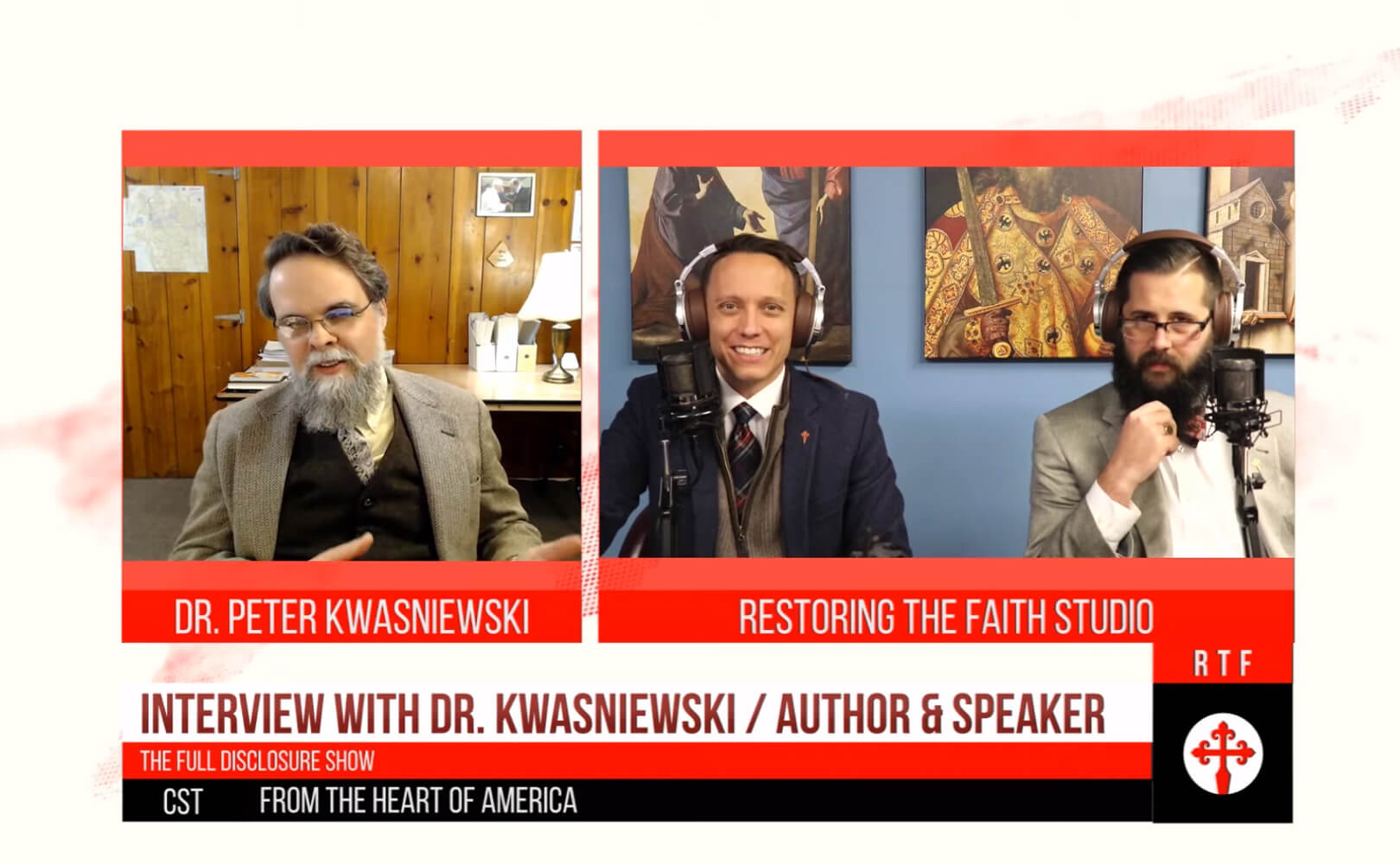A couple weeks ago, I posted my interview with Joe and Mike at Restoring the Faith Media on their new show, Full Disclosure. RTF is yet another Catholic apostolate making great video content, so if you haven’t checked out their channel yet, you should.
Today, I wanted to share another one of their interviews, this time with our very own Dr. Peter Kwasniewski. If you’ve ever wanted to know what makes our prolific in-house liturgical theologian extraordinaire tick, this is the video for you.
Rather than offering an introduction to the piece, I’ll let Peter explain in his own words what you can expect:
I know there’s a certain “saturation” of items to look at / listen to out there at the moment, but those who are interested in learning about my journey to the traditional liturgy (via a liberal suburban parish, the charismatic movement, the discovery of philosophy, the “reverent Novus Ordo,” etc.) will get a lot from this interview. I also sum up why I love the TLM.
An excerpt:
Mike: “So what would you say to the person who’s hearing you talk, Peter, and they’re saying to themselves, look, I consider myself to be a faithful Catholic, I go to Mass every Sunday (at least)—you might even have people who go on First Fridays and First Saturdays, and certainly all the days of obligation, they pray the Rosary, but they go to the Novus Ordo Mass—and they’re thinking to themselves: “This guy who went to Georgetown, he’s a PhD, he understands Latin and what’s going on; I don’t understand what’s going on. How can I enter deeply into this liturgy? What would you say to those people?”
Me: “The first thing I would say: God bless you. Keep doing what you’re doing. Keep praying the rosary, keep doing penance, keep going faithfully to Mass. So it’s not that you’re doing anything wrong. I think what I would say to them is: there’s more. There’s more in your faith that you haven’t discovered yet. And you can discover it. It does not require a high education, a doctorate, Latin familiarity, it doesn’t require any of that. What is requires is… the patience of love.
“What I mean by that is the liturgy has always been understood as something so profound and so transcendent that it will take you your whole life to get to know it—just like it takes your whole life to get to know somebody else, your friend, your wife, whoever it is. With God and with the things of God, we shouldn’t expect to ‘get it’ right away. We shouldn’t expect to come to Mass and ‘If I don’t understand what they’re saying right away, then forget it, I’m quitting.’ That’s not the proper attitude to have.
“I can say, I’ve gone to the traditional Mass so many times I don’t think I could count the number… and I’m still reading my missal—sometimes I read my missal, sometimes I put it down and just pray, I watch the priest, I watch the ministers, I pray in my own words, or I pray in the words of the missal, you can participate in a lot of different ways—but every time I’m still seeing something new that I haven’t noticed before, either with my eyes, with my ears, in my missal, wherever it is. It’s so rich that you never get to the bottom of it. And this is not something that is in principle closed to anybody who can read, or even anybody who can pay attention. If you go to a solemn High Mass and you see the priest and the deacon and the subdeacon at the altar in their beautiful sacred dance, that wonderful choreography of the traditional liturgy, and the incense, and you hear the music—it’s not a cerebral experience, it’s not primarily a rational, discursive experience.
“It’s an experience of what C.S. Lewis would call ‘thick religion.’ It’s an experience of multisensory immersion in the Prayer of the Church. And that happens with our knees: we pray with our knees, we pray with our eyes, with our nose when we smell the incense… We have so much reduced prayer to a merely rational, verbal, discursive level that people only think about it that way anymore. The Church in her wisdom, in her tradition, has thought about prayer in a much more in a—I don’t know how to put it—an existential, total way that involves the whole man. And that’s something that, when people attend, especially if they can attend a High Mass or a solemn High Mass in the traditional form, they really have that sense of an overwhelming, multisensory, multilayered experience.
“The Novus Ordo, unfortunately, is very one-dimensional, very horizontal, very rationalistic. It aims at imparting a certain message in the vernacular and that’s it. For me, at this point in my life, that’s like eating white bread, plain white bread. It has no nutritional value, at least as far as the human psyche is concerned. It’s a liturgy that is very low-fat, low-calorie. And I want my liturgy to be rich and thick and full of religion.”


